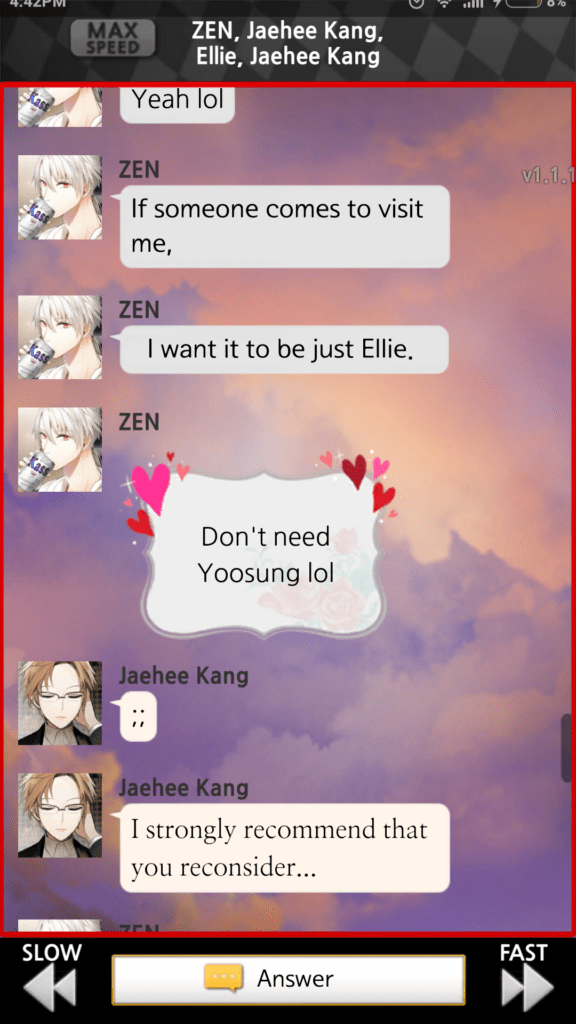Mystic Messenger was, for me and many others, a relatively groundbreaking game amidst the many, many dating simulator/visual novel games out there during its release in 2016. To revisit the game in 2023 was an experience full of nostalgia, but also one with a better eye for the shortcomings of the game.
As a seasoned player of the game genre, I at first defaulted to knowing how the game works: pick the best choices that increase the relationship meter for your desired interest, and don’t try to increase relationship meters with anyone else. This was also the primary suggestion of many early Mystic Messenger players, as some friendly or flirty responses to characters other than your chosen romantic interest could actually damage your relationship with said interest. At its core, games of this genre are about either picking the correct branching choices, or being able to game various quantity meters (relationship, experience, a skill, etc) to meet a particular requirement. Despite knowing this, I wanted to actively try to play the main game as if I were playing it without that knowledge. Even when I played it for the first time, I was aware of the many guides online and used them to my advantage. This time around, I didn’t want to use any guides (save for the email responses, which generally are hard to understand).
This time, I wanted to be as much of myself as possible. Knowing that the game would lock me into a route after the 3rd day, I was generally friendly with everyone, and picked more “voice of reason” options overall. Even while I was locked into a route with Zen, I still chose options that were most like me. This meant being a little flirty with other characters, which would occasionally hurt my relationship progress.

I noticed how much the visual/text effects shaped my experience in the chatrooms. When I damaged my relationship with someone, the “heartbreak” animation was so dramatic that I felt like I had somehow lost more. The varied text fonts, text box designs, and effects all conveyed more emotion than plain text, adding more complexity to the characters themselves. Their personalities were shown visually, which helped me remember them more. Since we also could not type our own responses, the prewritten text responses also alerted me to how the game designers had to generalize the player into particular personalities at any given choice. Noticing these elements gave me a greater appreciation for the game’s design, as well as the choices that the designers had to make.

Interestingly, some found these effects to be more distracting than helpful. In class discussion, someone noted how the text fonts and effects made the experience more jarring and hard to understand. They also noted now the translation was a bit rough at times, drawing them away from the immersion. These, coupled with the game demanding your attention frequently in real time, showed me how Mystic Messenger is not a fun experience for everyone. Reflecting on it, the font and effects make the game extremely inaccessible for those with visual/reading disabilities, and generally can make it a confusing experience for those who aren’t used to visual novels/dating simulators already. The demand for interaction within limited time frames in real time is also a decent burden on the player. While it can certainly be in character for someone to text at 3am, it seems to be more punishing on the player when they cannot stay up/be awake to interact in the chatroom since they must use in-game currency to replay it.
While the chill jazz still makes the game atmosphere less intense, Mystic Messenger asks for more dedication and effort than other games of its genre. It certainly pushed the creative boundaries of the genre and helped create a new style, but today there still remains areas where new designers can take note and improve the style in new directions.


I really appreciated your insight regarding the game’s accessibility for individuals with visual or reading disabilities, which is crucial for making our games more accessible. The font and effects may present barriers to those with specific needs, making the game less inclusive and potentially confusing for players who are unfamiliar with visual novels or dating simulators. It highlights how these design choices can impact the overall experience and accessibility of the game.
Hi Annie! I loved reading about your experience as someone who is revisiting the game, rather than playing it for the first time. I didn’t even know you get locked in after day 3. I remember having to chose between saying bye to Yoosung or Zen and it was stressing me out for real… I also really appreciate you bringing up ways the game studio could improve on accessibility and inclusivity!
Hi Annie, I enjoyed reading about your experience coming back to the game. An interesting point that you bring up is using guides or giving out responses that are most like you. I wonder to what extent is using guides taking out the user experience in game and also to what it comes to add.